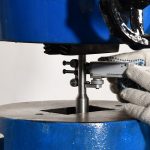As India’s energy grid rapidly adapts to incorporate large volumes of Renewable Energy, Coal-Based Thermal Power Plants (CBTPPs) are under increasing pressure to operate flexibly, reliably, and sustainably. These plants must frequently shift between varying load conditions—often outside their original design parameters. This shift introduces new degradation mechanisms, making the conventional approach to inspection and integrity management less effective.
To address this evolving challenge, the Knowledge-Based Approach (KBA) has emerged as a contextual and experience-driven methodology that helps power plants:
- Proactively identify failure-prone areas
- Estimate the remaining life of critical components
- Establish early warning systems suited to flexible operational patterns
What is a Knowledge-Based Approach (KBA)?
KBA is built on practical knowledge accumulated from real-world failure investigations and operational experiences across similar plants and environments. Unlike generic models, it leverages:
- Localized intelligence
- Metallurgical assessments
- Hands-on field insights
This is particularly valuable for Indian power stations, which deal with challenges such as:
- Non-uniform coal quality
- Ageing infrastructure
- Frequent ramp-up/ramp-down operations due to renewable intermittency
These operating anomalies are often not captured in standard frameworks, making KBA an essential tool for:
- Thermal fatigue detection
- Creep-fatigue interaction identification
- Short-term overheating prediction
- Corrosion analysis under fluctuating steam conditions
Why KBA is Critical for Indian Thermal Power Plants
The real strength of KBA lies in its adaptability. It allows inspection and maintenance plans to be shaped by:
- In-situ observations
- Operational anomalies
- Known degradation patterns
Using tools like:
- Microstructural evaluations
- Hardness profiling
- Oxide scale analysis
KBA helps identify early signs of component stress or wear, especially in critical assets such as:
- Boiler tubes
- Headers
- Turbine sections
These components are subjected to thermal cycling, leading to:
- Stress concentration
- Accelerated material wear
- Fatigue-related damage
- Temper embrittlement
Key Benefits of the Knowledge-Based Approach
Implementing KBA enables power plant teams to:
- Identify vulnerable equipment
- Make timely and evidence-based maintenance decisions
- Avoid unnecessary replacements
- Reduce forced outages
- Improve uptime and reliability
Rather than relying on static inspection schedules, KBA empowers operators to act based on field evidence and degradation mapping, offering a realistic understanding of operational risk.
Tailored Inspections for Regional Challenges
In India, factors like:
- Climatic conditions
- Coal composition
- Water chemistry
- Maintenance practices
vary widely. A one-size-fits-all inspection strategy is ineffective. KBA offers a nuanced, regionally tailored inspection methodology that allows operators to focus their time and resources on the most critical and damage-prone components.
Ensuring Grid Stability Through KBA
India’s CBTPPs play a vital role in grid balancing, especially during renewable energy fluctuations. KBA supports this by:
- Minimizing unplanned downtimes
- Ensuring high equipment readiness
- Enabling proactive plant management
Conclusion
As Coal-Based Thermal Power Plants in India are increasingly required to operate under flexible and demanding conditions, traditional inspection frameworks fall short. The Knowledge-Based Approach (KBA) offers a predictive, plant-specific, and strategic methodology tailored to the real-world challenges of modern energy infrastructure.
KBA is more than a tool for compliance—it is a critical framework for reliability, risk mitigation, and long-term thermal asset life optimization.



